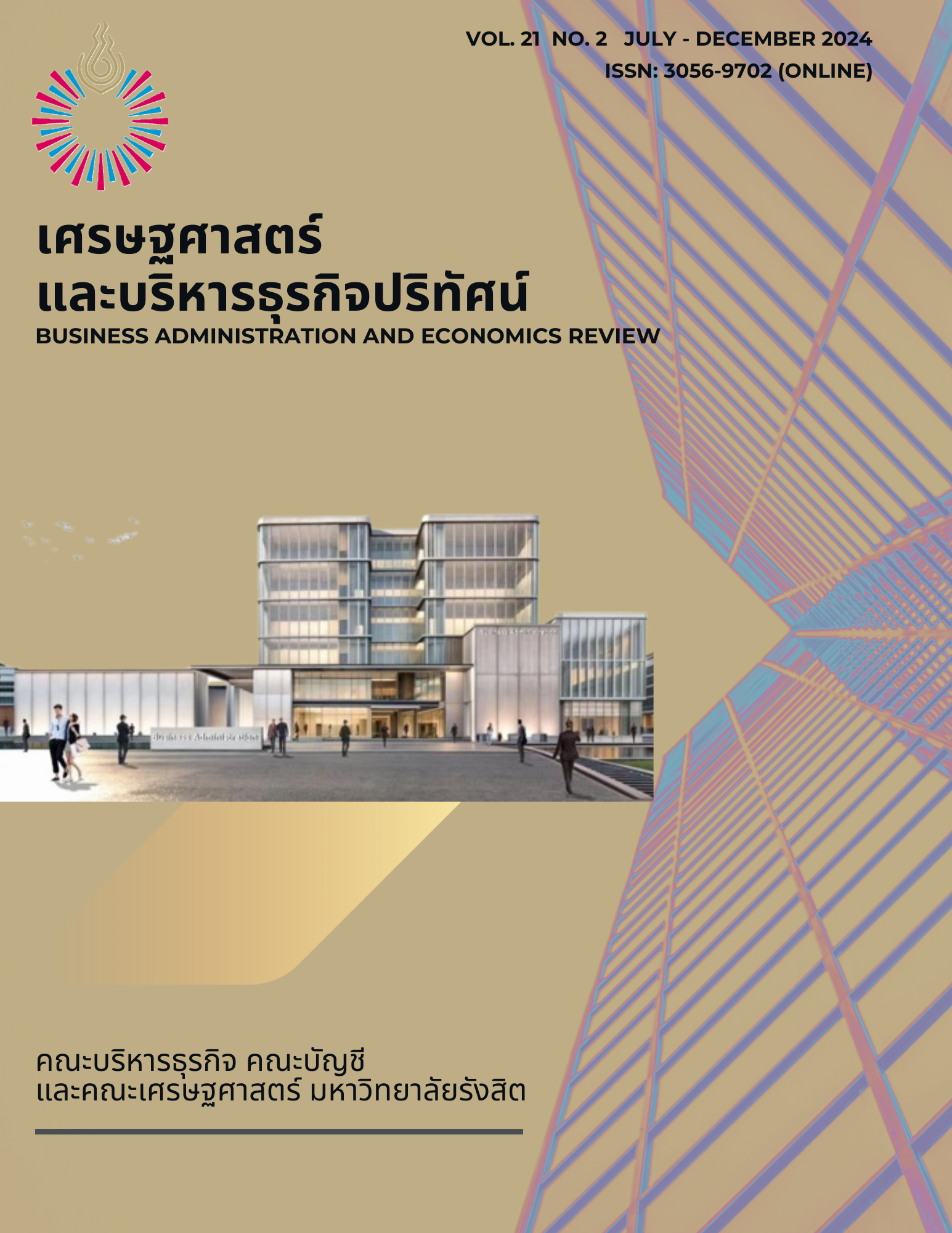STUDY OF FACTORS AFFECTING THE EXPORT CAPABILITY OF THE PROCESSED FOOD EXPORTER BY USING DELPHI TECHNIQUE
Keywords:
Processed food, Export capability, Delphi TechniqueAbstract
The objective of this research was to study factors that affect the export capability of the processed food exporters by using Delphi technique. Data were collected from a sample group of 17 people who work as processed food exporters, representatives of government agencies that related to export activities and policy, lecturers who have expertise in import and export courses, and customs officers. Purposive sampling was used as sampling technique in this research. Data were collected in 2 rounds. For the first round, in-depth interview was used to collected data, content analysis and word grouping were then used as the tools to analyze data from the in-depth interview. Questionnaire was used to collect data in the second round, mean value and inter quartile range were used as the tools to analyze the data from the questionnaire. The research results have shown the factors that affect the export capability of processed food exporters are 1) the characteristics of exporters, 2) policy and government support, 3) logistics activities, and 4) market and economy. Factors that related to the duration of business operations, supporting capital in exporting products, customs clearance activities, and reducing tariff for importing products into foreign markets were the sub-factors with the highest level of importance among the main factors in each area. Therefore, if processed food exporter focuses on these 4 factors, it will improve the export capacity of their business.
References
Ammara Dokmai and Suphalak Sriwilai, (2022). Guidelines to Increase the Efficiency of Exporting Air Freight. Journal of Management Science Review. 22(1). pp. 233-240.
Chatrudee Jongsureeyapart and Tanaporn Janapiraganit. (2019). Risk for Exporting Processed Fruit of Thai SME to India Market. Journal of Social Sciences Srinakarinwirot University, 22(1), pp. 46 – 58.
Chaiyos Chaimunkong and Mayuphun Chaimunkong. (2001) Transportation Strategies. 2nd ed., Bangkok: Vision Prepress.
Chotima Jotikasthira1 and Kritsaya Maai, (2023). EFFICIENCY ENHANCEMENT OF THE EXPORT OF FROZEN PROCESSED FOODS TO SUPPORT THE EASTERN ECONOMIC CORRIDOR (EEC) DEVELOPMENT PROJECT BY ADOPTING SCOR MODEL. Panyapiwat Journal. 15(3). pp. 1-14.
Food Intelligent Center. (2023). Thai food industry, 4th quarter, 2022 overview and 2023 trends. Retrieved from https://fic.nfi.or.th/foodindustry_quarterlySituation-detail.php? smid=2651
Kanapos Phuwaborirak, (2021). Production structure of the Thai food industry. Retrieved from: https://researchcafe.tsri.or.th/thai-food-industry/
N, Dalkey and Q, Helmer. (1963). An Experimental Application of the Delphi Method to the Use of Experts. Management Science, 9(3). pp. 458 – 467.
Natenapha Wailerdsak. (2558). Exporting Problems and Barriers of Thai Processed Food Products to ASEAN Markets. Journal of Humanity and Social Science (Rangsit University), 10(18), pp. 7 – 21.
Office of Small and Medium Enterprise Promotion. (2008). Guidelines for Increasing Export Capacity of SMEs. Retrieved from: : https://www.sme.go.th/upload/mod_download /chapter-9-20171024123942.pdf
Oman, C. (1984). “New forms of international investment in developing countries”, Paris: OECD Development Centre.
One Stop Service, Ministry of Commerce, (2021). Export Process. Retrieved from: https://onestopservice.ditp.go.th/file/DB026_HS04100010.pdf
Podchanee Sriwichian, (2011). An Analysis of Processed Food Industry Patterns in Suphanburi Province. [Master Thesis]. Silapakorn University.
Prapawan Tiyamani. (2019). GUIDELINES FOR INCREASING EXPORT CAPACITY OF PROCESSED FOOD PRODUCTS OF THAI SMALL AND MEDIUM ENTERPRISES TO EAST ASIA MARKET. [Master Thesis]. Thai-Nichi Institute of Technology.
Ratchayuth Kittipeerakij, (2014). Success factors in exporting processed food to support the opening of the ASEAN Community. Rmutt Global Business and Economic Review. 9(2). pp.103-115.
Sinee Sangrasamee, (2004). International Business and Economic Change. 2nd ed., Bangkok: Ramkhamhaeng University Press.
Sousa, Carlos. (2004). Export performance measurement: An evaluation of the empirical research in the literature. Academy of Marketing Science Review. 2004(9)., pp. 1-22.
Stock, J.R. & Lambert, D.M. (2001). “Strategic Logistics Management. 4th ed., New York: McGraw-Hill.
Sujinda Chemsripong, (2017). Factors Affecting Export Ability of Herbal Business in Phitsanulok Province. Journal of Business, conomics and Communications. 12(2)., pp. 161-175.
Thaipost. (2021). The effects of COVID-19 drag down Thai food exports in 2020 to 980 billion baht. Retrieved from: https://www.thaipost.net/main/detail/93448
Thapana Boonla. (2006). Thailand Logistics. Bangkok: Thai-Nichi Institue of Technology.

Downloads
Published
How to Cite
Issue
Section
License
Copyright (c) 2024 Business Administration and Economics Review

This work is licensed under a Creative Commons Attribution-NonCommercial-NoDerivatives 4.0 International License.
The contents in Business Administration and Economics Review can be used for publication. But do not modify, modify or use it for trade and profit.

